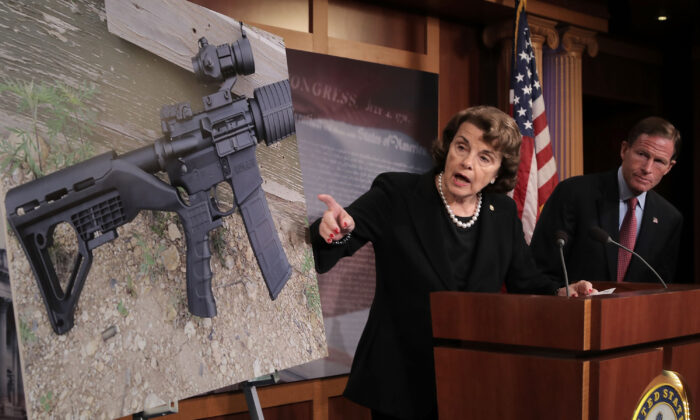By Zachary Stieber
The U.S. government was wrong when it said a ban on machine guns applied to bump stocks, a federal court ruled on Jan. 6.
The U.S. Bureau of Alcohol, Tobacco, Firearms, and Explosives (ATF) in 2018 claimed that two laws banning machine guns meant bump stocks were illegal, reversing its earlier position. The move, backed by then-President Donald Trump, came after a man carried out a mass shooting in Las Vegas, using bump stocks to fire more rapidly.
Michael Cargill, a Texas resident who had to surrender bump stocks due to the reversal, sued in 2019, arguing that the ATF and its parent agency, the U.S. Department of Justice, violated the Constitution by usurping the role of Congress in defining the machine gun ban as extending to bump stocks.
“Cargill is correct. A plain reading of the statutory language, paired with close consideration of the mechanics of a semi-automatic firearm, reveals that a bump stock is excluded from the technical definition of ‘machine gun’ set forth in the Gun Control Act and National Firearms Act,” the U.S. Court of Appeals for the Fifth Circuit said in its new ruling.
Machine guns are defined as a weapon that shoots, or is designed to shoot, or “can be readily restored to shoot,” more than one shot automatically without manual reloading by “a single function of the trigger.” The term includes “the frame or receiver of any such weapon, any part designed and intended solely and exclusively, or combination of parts designed and intended, for use in converting a weapon into a machinegun, and any combination of parts from which a machinegun can be assembled if such parts are in the possession or under the control of a person,” according to the Gun Control Act of 1968, one of the laws cited by the ATF.
The ruling noted that semi-automatic weapons do not fall under the definition because one pull of the trigger corresponds to the firing of a single bullet.
Bump stocks are accessories that, when attached to a weapon, let a shooter speed up the firing mechanism of a semi-automatic weapon, enabling a quicker discharge of bullets. But it does not change the mechanics of a semi-automatic weapon, or the crucial aspect of needing to re-engage the trigger to fire an additional bullet, U.S. Circuit Judge Jennifer Walker Elrod, a George W. Bush appointee writing for the majority, wrote.
“Without a bump stock or the use of an alternative bump technique, the user must provide manual input by pulling the trigger with the muscles of his trigger finger. With a bump stock, the shooter need not pull and release his trigger finger. But the shooter must still apply forward pressure to the weapon’s forebody in order to maintain the shooting mechanism,” Eldrod said. “Again, the manual input remains, even though its form changes.”
Weighing against the government was how the ATF for years after bump stocks were invented in the early 2000s decided they did not fall under the machine gun ban. That changed under public pressure following the 2017 Las Vegas massacre, which left 60 dead and hundreds wounded. The ATF’s final rule stated that the term machine gun “includes a bump-stock-type device, i.e., a device that allows a semi-automatic firearm to shoot more than one shot with a single pull of the trigger by harnessing the recoil energy of the semi-automatic firearm to which it is affixed so that the trigger resets and continues firing without additional physical manipulation of the trigger by the shooter.”
Not Unambiguous
Cargill argued in his suit that the government’s interpretation of machine gun was wrong. Even if it may have been right, Cargill offered, the text of the statute was not unambiguous, which means the rule was not allowed under court precedent.
Courts have been split on whether the ATF’s actions were legal. Several appeals courts had sided with the government against the rule, including the U.S. Court of Appeals for the Fourth Circuit, while several other courts, including a different appeals court, had said the agency overstepped its authority because the law was ambiguous.
In the new ruling, the majority said that the rulings for the government—including one that reasoned “single function of the trigger” could mean “a single pull of the trigger from the perspective of the shooter”—were based “on words that do not exist” in the law, and that a plain reading means bump stocks do not certainly fall under the definition.
“The first thing to note is that the ultimate subject is machine gun, and the subject complement is weapon. In other words, a machinegun is defined by reference to what kind of weapon it is. But identifying the subject of the sentence is only our first step. We next look, second, to the fact that the term weapon is defined by how it shoots. So, again, the definition refers to the device being made to shoot, not the person or thing doing the shooting. Third, the manner of shooting must be automatic. Fourth—and critically—the prepositional phrases define the firing process’s requirements from a mechanical perspective. The process must occur by a single function, and the single act must be by the trigger. In short, there is no mention of a shooter,” the majority said.
“The grammatical structure continuously points the reader back to the mechanics of the firearm. The statute does not care what human input is required to activate the trigger—it cares only whether more than one shot is fired each time the trigger acts.”
Because of the mixed rulings from circuit courts, Cargill’s lawyers expect the government to appeal to the U.S. Supreme Court, which has previously refused to take up cases against the rule.
“We are pleased that a circuit court has finally—and decisively—recognized that Congress must be the one to pass any bump stock ban,” Mark Chenoweth, president and general counsel at the New Civil Liberties Alliance, which has been representing Cargill, said in a statement. “The resulting circuit split should bring this decision to the U.S. Supreme Court’s attention promptly and supply a suitable vehicle for deciding this issue once and for all.”
The Department of Justice did not respond to a request for comment.
The ruling does not have an immediate effect because the court remanded the case to a district court, which had ruled against Cargill, with orders to enter a judgement for Cargill.
Elrod was joined by Chief Judge Priscilla Richman, a George W. Bush appointee, and Circuit Judges Edith Jones, a Reagan appointee; Jerry Smith, a Reagan appointee; Carl Stewart, a Clinton appointee; Leslie Southwick, a George W. Bush appointee; Catharina Haynes, a George W. Bush appointee; Don Willett, a Trump appointee; James Ho, a Trump appointee; Stuart Kyle Duncan, a Trump appointee; Kurt Engelhardt, a Trump appointee; Andrew Oldham, a Trump appointee; and Cory Wilson, a Trump appointee.
Other Opinions
In a one-sentence concurring opinion, Haynes, joined by Richman, said, “I concur in the judgment only because I reluctantly conclude that the relevant statute is ambiguous such that the rule of lenity favors the citizen in this case.”
In a separate concurring opinion, Ho, joined by Richman and Southwick, said that due to the ambiguity, “Congress must take action if it wishes to criminalize bump stocks.”
In a dissent, Circuit Judge Stephen Higginson, an Obama appointee, joined by Circuit Judges James Dennis, a Clinton appointee, and James Earl Graves Jr., an Obama appointee, said that statutory language can be ambiguous enough to bear multiple interpretations but that shouldn’t lead to a ruling that one is incorrect.
“Today, our court extends lenity, once a rule of last resort, to rewrite a vital public safety statute banning machineguns since 1934. In conflict with three other courts of appeals, our court employs its new lenity regime to carve out from federal firearms regulation the bump stock—a device that helped the Las Vegas shooter fire over a thousand rounds during an eleven-minute long attack,” Higginson said.
“Therefore, our court uses lenity to legalize an instrument of mass murder. This is evident from our court’s attempt to confine its new lenity regime only to this statute, giving machinegun owners immunity from prosecution that is not shared by other offenders under the federal code.”






